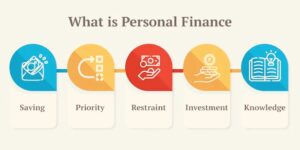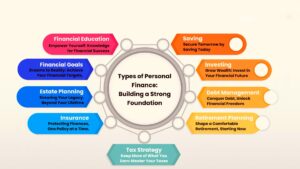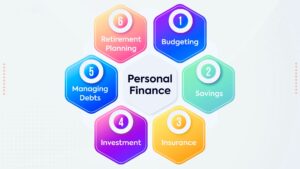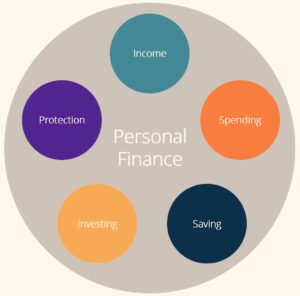How to Manage Personal Finance Like a Pro: A Step-by-Step Guide
Introduction: Why Managing Your Finances Matters
Did you know that nearly 78% of Americans live paycheck to paycheck? That’s a shocking statistic — and one that highlights the importance of learning how to manage personal finance.
Whether you’re just starting out in your career or looking to get a better handle on your money, effective financial management can help you achieve long-term stability and peace of mind.
In this guide, we’ll walk you through everything you need to know about managing personal finance — from creating a budget to investing wisely and avoiding common financial pitfalls.

The Problem: Common Financial Challenges People Face
Before diving into solutions, it’s important to understand the problems many people face when trying to manage their personal finances:
- Lack of budgeting skills: Many people don’t track where their money goes each month.
- High levels of debt: Credit card debt, student loans, and mortgages can be overwhelming.
- No emergency fund: Without a financial safety net, unexpected expenses can derail progress.
- Poor investment knowledge: Investing seems complex and risky to many beginners.
- Spending beyond income: Lifestyle inflation leads to overspending and debt accumulation.
These challenges make it difficult to achieve financial freedom — but they aren’t insurmountable.

Step-by-Step Guide to Managing Personal Finance
Here’s a proven system you can follow to take control of your finances:
1. Track Your Income and Expenses
Start by understanding exactly how much money comes in and where it goes each month.
- List all sources of income (salary, freelance work, side hustle).
- Record all monthly expenses (rent, groceries, utilities, subscriptions).
- Use apps like Mint, YNAB, or Excel spreadsheets to categorize and analyze spending.
2. Create a Realistic Budget
A budget helps you allocate funds wisely and avoid overspending.
- Follow the 50/30/20 rule: 50% needs, 30% wants, 20% savings/debt.
- Set limits for discretionary categories like dining out and entertainment.
- Review and adjust your budget regularly as circumstances change.
3. Build an Emergency Fund
An emergency fund protects you from unexpected costs like car repairs or medical bills.
- Aim to save 3–6 months’ worth of living expenses.
- Keep the fund in a high-yield savings account for easy access and growth.
- Contribute small amounts regularly until you reach your goal.
4. Pay Off Debt Strategically
If you have debt, create a plan to eliminate it without causing undue stress.
- Use the snowball method (pay smallest debts first) or avalanche method (highest interest first).
- Consider consolidating high-interest debt into lower-rate loans.
- Never ignore minimum payments; always pay on time to protect your credit score.
5. Start Saving for the Future
Financial planning isn’t just about surviving today — it’s about thriving tomorrow.
- Contribute to retirement accounts like 401(k)s or IRAs.
- Automate transfers to savings accounts to ensure consistency.
- Explore investment options like index funds or robo-advisors if you’re new to investing.

Best Practices for Long-Term Financial Success
Once you’ve built a foundation, these practices will help you maintain and grow your financial health:
- Live Below Your Means: Avoid lifestyle inflation and prioritize saving over spending.
- Automate Savings: Set up automatic transfers to savings and investment accounts.
- Review Your Credit Report: Check your credit report annually to spot errors or fraud.
- Invest Early: Take advantage of compound interest by starting early, even with small amounts.
- Educate Yourself: Read books, listen to podcasts, and follow reputable financial influencers.
Common Mistakes to Avoid When Managing Personal Finance
Avoiding these common mistakes can save you thousands of dollars and years of frustration:
- Making impulse purchases: Always ask yourself if a purchase is a need or a want.
- Ignoring insurance: Health, auto, and renters insurance protect you from major losses.
- Not setting goals: Without clear financial goals, it’s hard to stay motivated.
- Trying to keep up with others: Focus on your own financial journey, not someone else’s lifestyle.
- Putting off investing: Time is your greatest asset when it comes to growing wealth.

Expert Insights and Case Studies
“The most powerful thing you can do with your money is to stop letting it control you. Take control with a simple, consistent plan.” – Ramit Sethi, Author of I Will Teach You to Be Rich
Case Study: Sarah’s Journey to Financial Freedom
Sarah was a recent college graduate with $40,000 in student loan debt and no savings. After attending a personal finance workshop, she created a budget, started tracking her expenses, and began paying down debt using the avalanche method.
Within two years, she had paid off half her debt and built a $5,000 emergency fund. She now contributes 10% of her income to a Roth IRA and feels confident about her financial future.
Lesson: Small, consistent actions lead to big results over time.
Conclusion: Take Control of Your Financial Future Today
Learning how to manage personal finance is one of the most empowering things you can do for yourself. It gives you the tools to live intentionally, avoid debt traps, and build lasting wealth.
Remember, it’s not about being perfect — it’s about being consistent. Whether you start by tracking your spending or opening a savings account, every step counts.
If you found this guide helpful, share it with a friend who might benefit too. And don’t forget to leave a comment below — we’d love to hear your thoughts or answer any questions!
Frequently Asked Questions (FAQ)
What is personal finance management?
Personal finance management involves planning and controlling your income, expenses, savings, and investments to achieve financial goals and security.
Why is budgeting important?
Budgeting helps you understand where your money is going, avoid overspending, and allocate funds toward your priorities like savings and debt repayment.
How much should I save for emergencies?
Most experts recommend saving 3–6 months’ worth of essential living expenses in an emergency fund.
Is investing safe for beginners?
Yes, especially if you start with low-risk options like index funds or ETFs. Always research or consult a professional before making investment decisions.
Can I manage my finances without professional help?
Absolutely. With the right tools, education, and discipline, you can manage your personal finances effectively on your own.
External Resources:
Want More Financial Tips?
Subscribe to our newsletter for weekly updates on personal finance, investing, and smart money moves.
